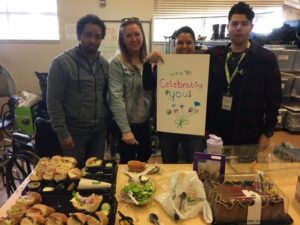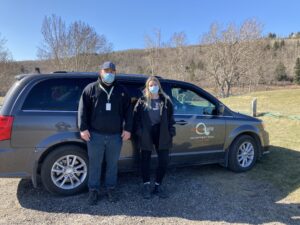Housing First; What Comes Second?
Shaundra Bruvall | June 16, 2021
In the homeless-serving sector, we operate on a principle of Housing First. Housing First means providing affordable, supportive housing to individuals/families experiencing homelessness as quickly as possible without expecting them to meet certain requirements (such as ‘sobriety’) before being allowed a home. In our experience, housing gives people the opportunity to work on other aspects of their lives without being constantly displaced. But housing is not the only solution or supports that people need. We sat down with some of Alpha House’s Community Housing Caseworkers to hear their thoughts on what comes next after ‘Housing First.’

We know about some of the barriers individuals face when trying to transition from homelessness to housing – lack of income, issues with obtaining ID/bank accounts, unmet medical needs etc. What are some of the barriers you see when it comes to someone newly housed remaining housed?
Most newly housed folks need to learn/relearn basic household and hygiene skills. Emergency Shelters do not always have the capacity to allow clients to learn how to perform these tasks so it can be a struggle when someone is newly housed.
Many folks also struggle with feeling as though they don’t fit into their new community, they may feel they are being targeted due to their appearance or behaviors and rarely feel comfortable asking for support from neighborhood support systems. It often takes months or years for a client to build a sense of community and belonging. This can lead to struggling with boundaries around things like guest management with clients inviting their (still unhoused) friends to stay, as that group of people is where they feel most comfortable.
What do Alpha House’s caseworkers do to reduce these barriers for clients?
From the perspective of learning/relearning basic household and hygiene skills, caseworkers are able to assist with basic chores, provide insight and information, and work off their rapport with clients to support skill building and overall confidence.
For community integration, caseworkers are able to do tours of the community, provide lists of community supports and events, and provide encouragement and supports to help clients reintegrate within their community.
The importance of having someone you trust cannot be overstated here. Rapport with clients is critical to supporting their needs and helping them gain confidence and feel more comfortable.
How big of a part does a neighbourhood/community play in helping individuals stay housed? Are there things we can do better as a community to prevent re-entry into homelessness?
The neighbourhood and community play a big part in a client’s successful housing. When clients feel like they are part of a community, we often see greater success in housing stability. We all play a part in our communities to help people feel welcome and that is no different when it comes to those we house. Simple things like smiling and saying hello or introducing yourself make a huge difference. More involved engagement like having a coffee with the individual and taking the time to get to know them is very beneficial to the success of housing programs. Those we serve have often been experiencing homelessness for a long period of time and feel alienated from society, so reintegration and kindness are key.
If our clients feel welcomed and understood by their neighbors, they are more likely to integrate quickly and to show a sense of pride in their housing, which promotes hope and is crucial to long-term housing stability and overall wellbeing.
As a community, we can help prevent re-entry into homelessness by understanding that everyone deserves a chance and has a unique story. Greet your neighbours regardless of their past or appearance.
Society as a whole could be more open to seeing unhoused individuals as people that are worthy of interaction and compassion.
Anecdote: I live in the deep SW and one day stopped to fill up with gas, an Alpha House client was in the parking lot asking for money to get on the bus. When he asked me, I showed him my employee ID badge and he immediately held out his hand to show me a possible broken hand with cuts all over it. He only needed to get on the bus to go get medical attention and had no money to do so. Everyone else that he approached walked away from him as fast as possible when he really just needed help and support.
Can you share some thoughts on the importance of landlord relationships when it comes to housing stability for clients? How do you go about building those relationships and reducing stigma that can come with housing previously homeless individuals?
Landlord relations are incredibly important as not all individuals have an easy or seamless transition to independent housing. With a patient and understanding landlord/lady, it is easier for individuals to be successful in their housing. One critical piece is establishing a landlord-tenant relationship where the landlord addresses concerns they are having with a client themselves in a direct and gentle approach. If a landlord/lady requests Alpha House discuss all concerns with a client it does not build a client’s capacity to have these discussions and overall, it reduces their accountability. All of our clients are their own lease holders and need to attend the lease signing with the landlord; we also encourage clients to call their landlord for small fixes and concerns just like a non-program tenant would. This builds capacity and self-advocacy as well as relationships. Forming a relationship helps the property owner see a client as a person who deserves housing, and not just someone who used to be homeless or has an addiction.
What about neighbour relations? How do you encourage clients to integrate into their community?
In inner city areas it is easier to integrate and not feel so targeted as opposed to in suburban communities. Alpha House never wants to make a client feel bad about their appearance or experience so when working with clients we tend to focus more on being a good neighbor and what that means. We talk about not having a lot of guests over at any one time, using appropriate garbage cans, keeping the apartment a good level of cleanliness etc. Overall, integration into community is not something that can be easily achieved without society as a whole becoming more open minded towards our clients.
Where are there gaps (both in the homeless-serving sector and overall as a society) when it comes to housing stability? What things are we missing as a collective group to prevent someone losing their housing or to be more inclusive and well rounded in general?
To help the client succeed and maintain housing stability, communication is key. When housing someone from homelessness into housing, the transition period is very hard for the client. We often see clients who sleep on their balconies, or have their bed in the living room. As a collective, we all need to be patient and communicate the struggles that the client is facing at the time and work together to ensure adequate supports are provided.
Additionally, the Homeless Serving sector could do a better job at educating society about the variety of reasons individuals become homeless. So many non-aware people assume that it is just based on drugs and alcohol, rather than seeing the trauma that so often leads to substance use as a coping mechanism.
We typically see studies that show prevention is more cost effective than reactionary programs – this is true in terms of crime prevention, injury prevention etc. Besides the humanitarian reasons to provide affordable housing to all and prevent homelessness, what do you see as the economic benefits of housing stability? (i.e. client interacts with police less often, fewer medical issues, less substance use etc.)
We often see a reduction in overall emergency services use, such as CPS and EMS interactions, as clients are housed and able to attend general medical appointments on a regular basis and address underlying health concerns.
Often times we see a reduction is substance use as a result of decompression. When clients are homeless their bodies go into a fight or flight mode. When they are housed we often see them decompress and they are able to relax, not having to constantly be looking over their shoulders.
We also often see mental health concerns stabilize as individuals are able to take care of themselves, stick to a medication regime, get better sleep and eat better, which all contributes to a positive state of mental health
Alpha House operates from a Housing First perspective meaning individuals are better able to work on other aspects of their lives if they have shelter security and a place to call home. In the context of “housing first, what’s second?” – what would you say comes second after housing?
Some of the most common ‘seconds’ we see are mental health, overcoming trauma, reconnecting with family or dealing with physical health concerns.
In addition to the above pieces, community reintegration and purpose, along with a sense of dignity and self-worth for the client are important. We help clients set goals and support their plans for the future. Having something to work towards and having hope for the future is critical.
Overall, we know that support needs to come second; it is about supporting clients in whatever way they need so they can find stability.
What types of philosophies do you follow as caseworkers to support your clients? Do you have any rules of thumb or best practices?
- Be honest to yourself and to the client
- Everyone deserves to be treated with dignity and respect. We work with people and not just numbers. Client choice is also very important. Every client has their own unique story, with underlying trauma as a big factor in why they were homeless. We support clients, no matter the choices that they make. As long as they are safe, and given the tools to remain safe in their homes.
- Harm reduction principals and to meet a client where they are at. We cannot move faster than them and for individuals who have been homeless or institutionalized most of their lives, it takes longer to feel comfortable being housed than someone who has been only episodically homeless.
- Celebrate the small successes with your clients and encourage self-sufficiency
